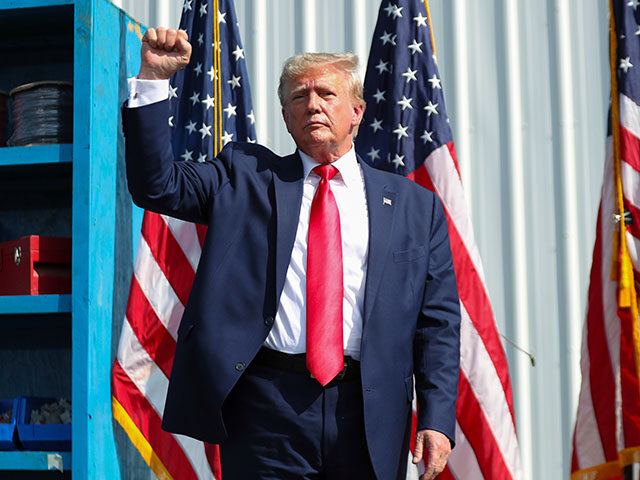The Republican National Committee (RNC), National Republican Senatorial Committee (NRSC), and National Republican Congressional Committee (NRCC) filed an amicus brief with the Minnesota Supreme Court on Friday in an effort to prevent a Democrat-aligned group from obstructing former President Donald Trump from the state’s 2024 presidential ballot, documents exclusively obtained by Breitbart News show.
The GOP committees filed the brief because they say Republican votes should decide the GOP presidential nominee, not courts or bureaucratic officials.
“The 2024 Republican presidential candidate will be decided by Republican voters, not courts or government officials,” RNC Chairwoman Ronna McDaniel said in a statement. “Disqualifying candidates from the ballot based on crimes they haven’t been charged with would set a destructive precedent for future elections and is purely political. Republicans are united in pushing back against this dangerous overreach.”
The effort to allow GOP voters the opportunity to elect a presidential nominee comes after the Minnesota Supreme Court turned down the Trump campaign’s attempt on October 13 to intervene in a ballot petition filed by a radical left group named “Free Speech For People.” The group argued Trump disqualified himself from appearing on the presidential 2024 ballot, citing the “insurrection clause” of the Fourteenth Amendment of the U.S. Constitution.
The Republican Committees’ brief argues, in part:
The Reconstruction Congress did not grant state officials sweeping authority to undermine the federal government. But Petitioners resurrected and reimagined Section Three of the Fourteenth Amendment to do just that.
Their proposed relief would interfere with political-party primaries, which violates Republicans’ First Amendment rights. Republicans argue Free Speech For People misread the text and history to apply Section Three to former Presidents and future Presidents, even though the text references the Article VI oath of office that no President has ever taken. And last, Free Speech For People defy Congress’s choice to end Section Three enforcement long ago.
The brief quotes the Supreme Court as explaining in 1995, “The people are the best judges [of] who ought to represent them. To dictate and control them, to tell them whom they shall not elect, is to abridge their natural rights.”
Minnesota is the first state where a Democrat-aligned group took action to block Trump from the ballot due to a state law that permits voters to petition the Minnesota Supreme Court to disqualify a candidate. Democrats are working to disqualify Trump in many states, such as Arizona, Michigan, California, and New Hampshire.
“We reject any attempts by outside actors to bar the clear frontrunner for the Republican nomination from participating in our party’s primary,” NRSC Chairman Steve Daines said in a statement. “Throughout our history, these decisions have been made at the ballot box, and this blatant attempt to rob Republican primary voters of their right to select the Republican presidential nominee would do lasting damage to our elections for years to come.”
“This is an obvious partisan attempt to try to usurp the will of the voters through the courts that will set a bad precedent with ramifications beyond this case. Republicans are united in allowing the will of the voters to prevail,” NRCC Chairman Richard Hudson said.
Many legal experts doubt the legal viability of keeping Trump off state ballots. Harvard Law Professor Emeritus Laurence Tribe and J. Michael Luttig, a former federal judge, argued in the Atlantic that the unproven legal argument to keep Trump off the GOP ballot is valid:
As students of the United States Constitution for many decades—one of us as a U.S. Court of Appeals judge, the other as a professor of constitutional law, and both as constitutional advocates, scholars, and practitioners—we long ago came to the conclusion that the Fourteenth Amendment, the amendment ratified in 1868 that represents our nation’s second founding and a new birth of freedom, contains within it a protection against the dissolution of the republic by a treasonous president.
The U.S. Supreme Court on Monday did not take a case about whether those who oppose Trump can disqualify the former president from the 2024 election under the “insurrection clause” of the Fourteenth Amendment.
The case is Joan Growe v. Minnesota Secretary of State, No. A23-1354 in the Minnesota Supreme Court.
Follow Wendell Husebø on Twitter @WendellHusebø. He is the author of Politics of Slave Morality.

COMMENTS
Please let us know if you're having issues with commenting.